How to write a thesis you will be proud of
with the Tiny Topic Framework
If you're fed up with trying to figure out how to write a thesis and endlessly scouring the internet, start using this framework to decide the exact topic to work on, conduct literature research without drowning in information and even write in a more engaging way.
Are you struggling with your thesis?
From the desk of
Leonardo Bugada
Mantua, Italy
RE: Tiny Topic Framework
Ehy, it's Leonardo
Everyone thinks that writing is the hardest part of a thesis, right?
Wrong.
Truth is, when you have a topic that interests you, the words come out easily, almost effortlessly.
Therefore the real problem is not writing, but finding the right thesis topic.
You see, I’m not a great writer.
But when I started applying the Tiny Topic Framework, I was able to write an excellent thesis in a very selective program.
It was a Second Level Master’s degree. It’s a course offered at Italian universities. It is a sort of PhD.
Very demanding.
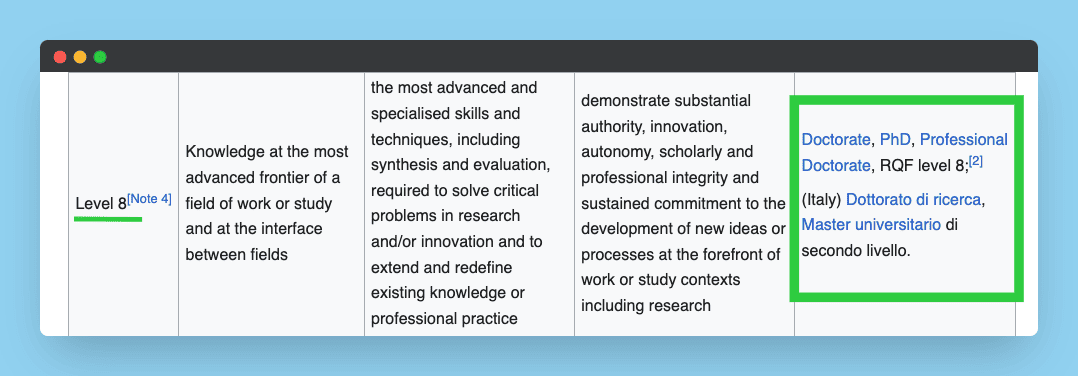
European Qualifications Framework, Level 8 (source: Wikipedia)
Finding a Tiny Topic was a turning point for writing the most difficult dissertation of my life.
(and by the way, achieving the highest score).
Keep reading, because I’ll show you what a Tiny Topic will do for your thesis and how to use the Tiny Topic Framework.
Why finding a Tiny Topic is essential for anyone writing a thesis
On this page, we are not discussing how to use Google Scholar or how to cite in APA style. That is basic stuff that can be learned by reading blog articles or watching a YouTube video.
Instead, today I want to talk to you about something powerful. Much more powerful than a basic how-to post.
For those who struggle to write a thesis and don’t even know where to start, a crucial step is finding a Tiny Topic. A Tiny Topic is a topic that is narrow, defined and concrete. It is the best way to start a thesis because it provides structure for both the research phase and the writing phase.
Once I perfected this framework, I began to gain clarity on how to proceed, what to write, and how to make my thesis interesting. I started to gain momentum and noticed that I was making good progress every day. As a result, I felt proud, calm, and confident.
Do you feel you don't have a clear framework or methodology to follow, and you have no cognitive angle to address how a writer should hash out a grand strategy for their thesis work?
Good, keep reading. This is for you.
Who is the Tiny Topic Framework for?
First of all, some bad news. The Tiny Topic Framework does not spare you from having to work on your thesis. In fact, you will probably have to work harder in some ways compared to writing a trivial and superficial thesis.
And now for the good news.
The Tiny Topic Framework is a suitable method for you if the following lines resonate with your beliefs:
You'd like to understand how to define an interesting and original thesis topic
You'd like to learn how to develop an original and creative position.
You'd like to figure out how to overcome writer's block and start writing a lot and well
The Tiny Topic Framework addresses these three major problems
"How to find the right method to decide on the exact topic to work on"
Do you feel that the most challenging part of writing a thesis is deciding on the exact topic to work on?
The solution. Follow a path of personal reflection that leads you from a general topic to a specific, well-defined, and concrete one. This way, you can start reading the literature and begin writing right away.
"How to move forward effectively without anxiety that generates tons of procrastination"
Do you not know how to structure a thesis, what chapters to write, and in what sequence? Does this confusion generate anxiety and cause you to waste a lot of time on marginal issues?
The solution. You are almost certainly struggling to move forward because you lack a framework to follow. A guiding model helps alleviate anxiety, allows you to always know what 'comes next', and stops you from procrastinating on pointless stuff (for example checking every 3 minutes the phone or reading about Elon Musk for "inspiration" 🤨).
"How to be motivated to start writing and finally complete the thesis"
Do you feel like you are writing without strength and coherence, almost like a series of blog posts?
The solution. If you find a small, focused thesis topic, you can more easily master it, which will help you feel increasingly confident in yourself day by day and provide you with the perfect tool to overcome writer's block.
All You Need is a Tiny Topic Framework
With this framework, writing a thesis becomes much less complex:
no demotivation
no confusion
no back and forth with your supervisor
no vague, confusing topics
no writer's block
no reading without even understanding
no repeating others' ideas
no AI
What you need is just a Tiny Topic based on a clear framework to follow.
Here’s how to write a thesis that will give you s-a-t-i-s-f-a-c-t-i-o-n.
Step 1) Define your deep interests.
The thesis is an original contribution that a student freely offers to all of humanity. A noble goal.
We need you.
The first fundamental step is to find what truly excites you. I call it "Deep Interest." Passion generates motivation, strength, curiosity, inspiration, willpower, determination, and charisma.
The writer's interest is contagious for the reader. It is worth spending the necessary time to explore your deep passions.
A simple way to get to know yourself is to look at your browser history. Search for recurring themes, interests you consistently gravitate toward, and curiosities that capture your attention.
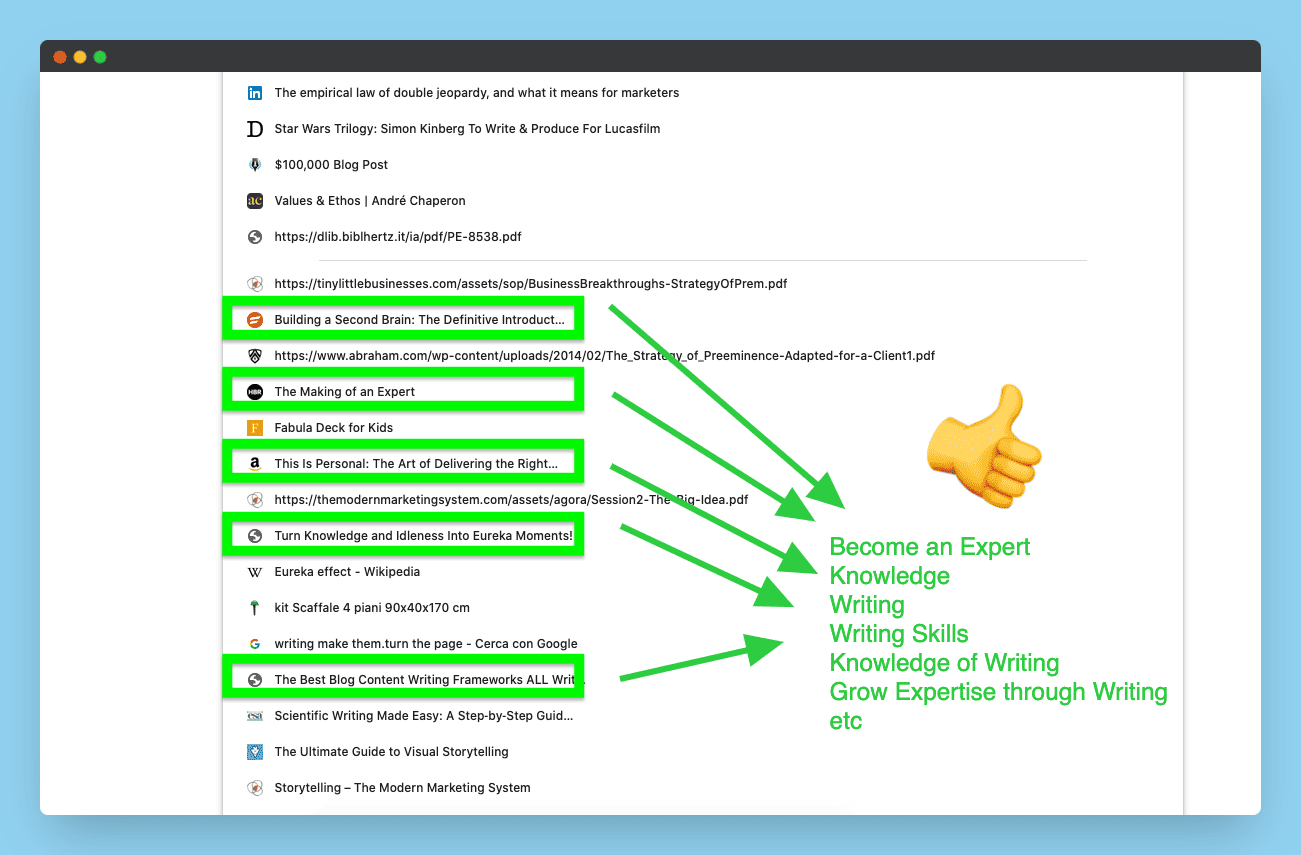
Find themes, patterns and recurring ideas in your browser history
Step 2) Choose a specific topic
Once you have found your true interest, you need to validate it in an academic context.
To find a valid topic, use the technique known as the Lotus Blossom Technique.
Start with a general topic and proceed to specify it more and more.Look at this
Example:
Geology
Volcanology
The volcanoes of Mexico
The history of Popocatépetl
The birth and apparent death of Paricutin
Do you feel the curiosity increasing after each step?
This is not random; these are well-known principles of how our brain works and what it is attracted to.
My deep interest ("becoming experts") can become much more specific:
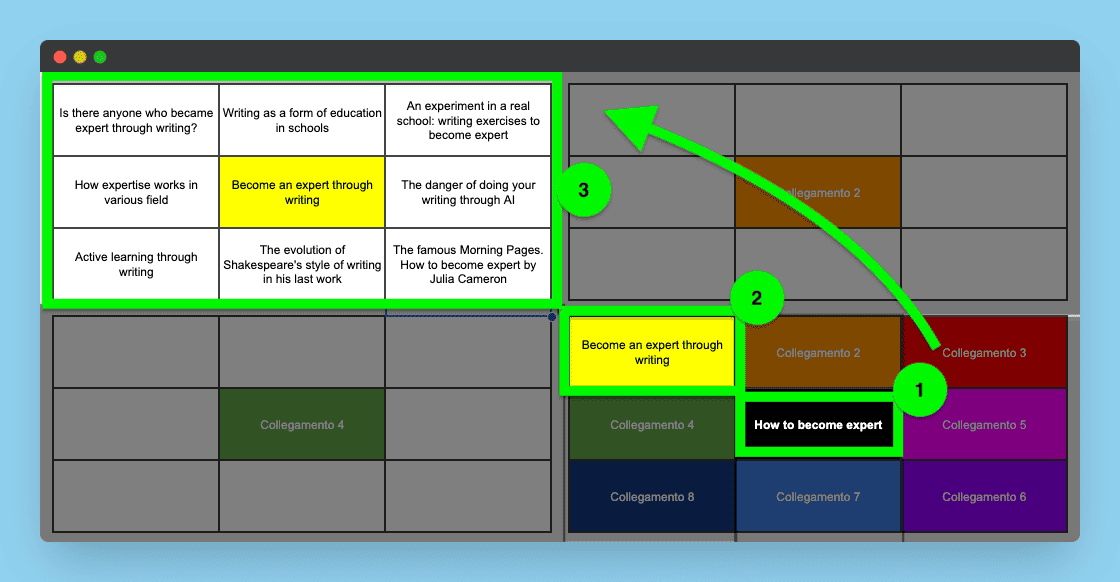
Lotus Blossom Tecnique. Expand three times on every broad topic
Step 3) Transform the specific topic into a research question
Now you need to transform the defined topic into a research question. The research question will be the beating heart of your thesis.
Your thesis essentially becomes the answer to the research question.
Building a solid research question depends on various factors. The most important factor is the thesis topic defined in Step 2. Another factor to consider is the type of methodology you want to adopt in your thesis.
For example, preparing a writing project for a school is different from analyzing the spread of Julia Cameron's Morning Pages.
Based on the example from the previous steps, a research question that could become my thesis is the following: "How do I create a course that teaches 14-year-old students in a school to develop ideas through writing?"
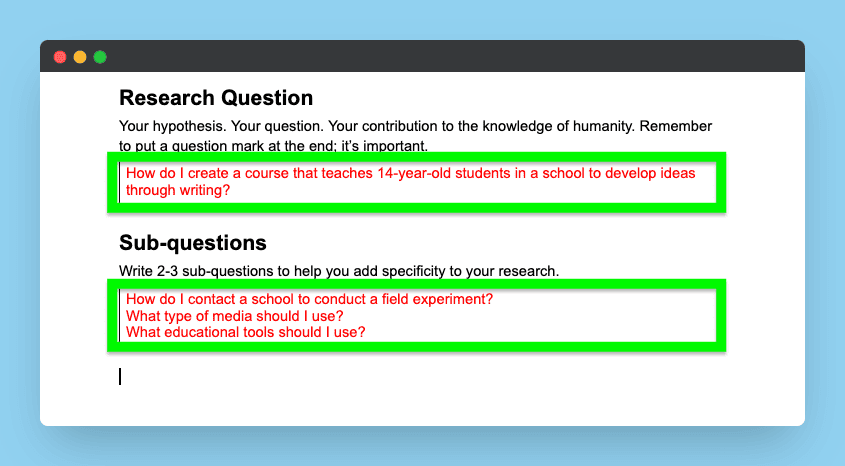
Now you can define the Research Question, the backbone of your thesis
How can I know the Tiny Topic Framework will work for me?
Maybe you’re wondering now, "All of this interests me a lot, but how can I be sure that I will achieve the promised results?"
Because I applied the same principles to myself with extraordinary results.
Recently, I completed an advanced university course in Media Education. In Italy, it’s called a "Master di secondo livello." It corresponds to Level 8 of the European Qualifications Framework, roughly equivalent to a PhD:

European Qualifications Framework, Level 8 (source: Wikipedia)
To complete this highly selective program, I had to write a thesis—the third thesis of my life.
I began experimenting on myself with various methods I found in books, papers, and courses.
I wanted to be organized and know exactly what to do at every stage of the academic research process.
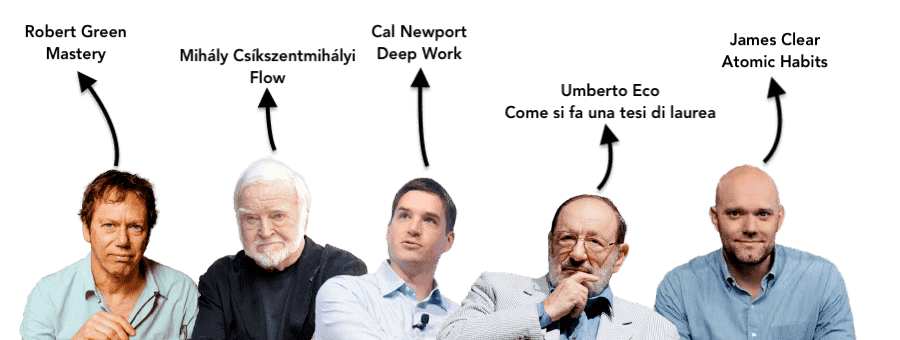
Authors that went into the Tiny Topic Framework
In the meantime, two things happened that brought me joy but also took up my time: a wife and two children. So, I had a fundamental need to optimize my limited time without procrastinating on social media and wasting a lot of time.
By applying and testing various strategies, I managed to complete my thesis in just a few months. It was an interesting thesis, appreciated by all the professors. The best part? It gave me immense personal satisfaction.

Using the Tiny Topic Framework leads to some interesting endings...
Start your thesis with the instructions on this page or get a step-by-step method
Option 1 - Do it yourself
Revisit the process I outlined on this page. Everything you need is here. You can start on your own and try to create a great thesis simply by following my instructions. There are no "secrets" to writing an excellent thesis. I have laid out the various key steps that are absolutely necessary for writing a well-crafted thesis.
Option 2 - Get Tiny Topic Framework (mini-course)
You can purchase the Tiny Topic Framework, a mini-course, and receive everything you need in just a few clear lessons, following a step-by-step method.
Ready to write a next-level thesis with Tiny Topic Framework? (TL;DR)
Here’s what you get when you purchase the Tiny Topic Framework:
You will start confidently right away. The Tiny Topic Framework is a step-by-step mini-course in text format. This means you won’t be forced to watch endless webinars just to receive small bits of information.
You will discover how to find your Tiny Topic. You will have a tested (and quick) pathway to accurately pinpoint the exact topic of your future thesis.
You will conduct focused research. There is too much information on the web. With a Tiny Topic, you will avoid drowning in a sea of information.
You will be able to proceed without hesitation. Writing a thesis involves many sequential tasks. With a Tiny Topic, you will have the right pace to break the work into manageable tasks.
You will obtain a clear framework based on a powerful cognitive angle. Thanks to the Tiny Topic Framework, you will have an overview of your thesis and always know what the next step will be.
Who is Leonardo Bugada anyway?
My name is Leonardo Bugada. Nice to meet you.
I got a degree in philosophy, I'm a teacher and a writer. I have read practically every book available on the topics of mental models, knowledge management, and intellectual work.
In addition to a solid theoretical framework, I have experimented in the field to see which theories are applicable, which are too abstract, and which, quite simply, are not suitable for a university student grappling with their thesis.
The result of years of work is Tiny Topic Framework, a mini-course that guides you through your thesis.

TINY TOPIC FRAMEWORK
Tiny Topic Framework will be published on 1 january 2025.
Be the first to get a copy of the mini-course, today with a special price. A launch sale is going on right now. Afterwards, the price will go up.
19€ 49€
Any question? Ask to info@thesishack.com
